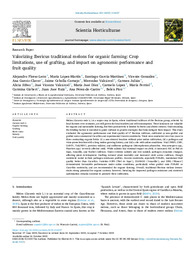Título :
Valorizing Ibericus traditional melons for organic farming: Crop limitations, use of grafting, and impact on agronomic performance and fruit quality |
Autor :
Flores León, Alejandro
López Martín, María
García Martínez, Santiago
González, Vicente
Garcés Claver, Ana
Cebolla Cornejo, Jaime
Valcárcel, Mercedes
Julián, Carmen
Sifres, Alicia
Valcárcel, José Vicente
Díez, María José
López, Carmelo
Ferriol, María
Gisbert, Carmina
Ruiz, Juan José
Pérez de Castro, Ana
Picó, Belén |
Editor :
Elsevier |
Departamento:
Departamentos de la UMH::Biología Aplicada |
Fecha de publicación:
2025-10 |
URI :
https://hdl.handle.net/11000/37854 |
Resumen :
Melon (Cucumis melo L.) is a major crop in Spain, where traditional cultivars of the Ibericus group, selected by
local farmers over centuries, are still grown for local markets and self-consumption. These landraces are valuable
for organic and sustainable farming, but their productivity is limited by biotic and abiotic stresses. Understanding
the limiting factors is essential to guide cultural or genetic strategies that help mitigate their impact. This study
evaluated the agronomic performance and fruit quality of 17 Ibericus cultivars, cultivated as non-grafted and
grafted onto commercial Cucurbita and experimental Cucumis rootstocks. Trials were conducted over two years in
three contrasting organic fields: (i) a non-stressed location without prior melon cultivation, (ii) a pathogen and
virus-prone location with a long melon-growing history, and (iii) a site with saline conditions. Viral (WMV, CMV,
CABYV, ToLCNDV), powdery mildew, and soilborne pathogens (Macrophomina phaseolina, Neocosmospora spp.,
Fusarium spp.) severely affected yield. While salinity had minimal impact on yield, it increased SSC in Piel de
Sapo, Amarillo, and Rochet cultivars. Under extreme salinity and low rainfall, pathogen dynamics changed,
affecting plant development. Grafting reduced plant mortality and increased yield across cultivars, though
rootstocks varied in their pathogen resistance profiles. Cucumis rootstocks, especially F1Pat81, maintained fruit
quality better than Cucurbita. Varieties 03PS (’Piel de Sapo’), 22AM-GO (’Amarillo’), and 32BL (’Blanco’)
demonstrated favourable performance under saline conditions, particularly when grafted onto F1Pat81 or
Cucurbita rootstocks, and are recommended for organic farming. Overall, traditional Ibericus melons demonstrate strong potential for organic systems; however, breeding for improved pathogen resistance and rootstock
optimization remains essential to promote their cultivation.
|
Palabras clave/Materias:
Cucumis melo L
Organic farming
Grafting
Biotic stress
Salinity
Fruit quality |
Tipo de documento :
info:eu-repo/semantics/article |
Derechos de acceso:
info:eu-repo/semantics/openAccess
Attribution-NonCommercial-NoDerivatives 4.0 Internacional |
DOI :
https://doi.org/10.1016/j.scienta.2025.114437 |
Publicado en:
Scientia Horticulturae Volume 352, October 2025, 114437 |
Aparece en las colecciones:
Artículos - Biología Aplicada
|
 La licencia se describe como: Atribución-NonComercial-NoDerivada 4.0 Internacional.
La licencia se describe como: Atribución-NonComercial-NoDerivada 4.0 Internacional.
.png)
